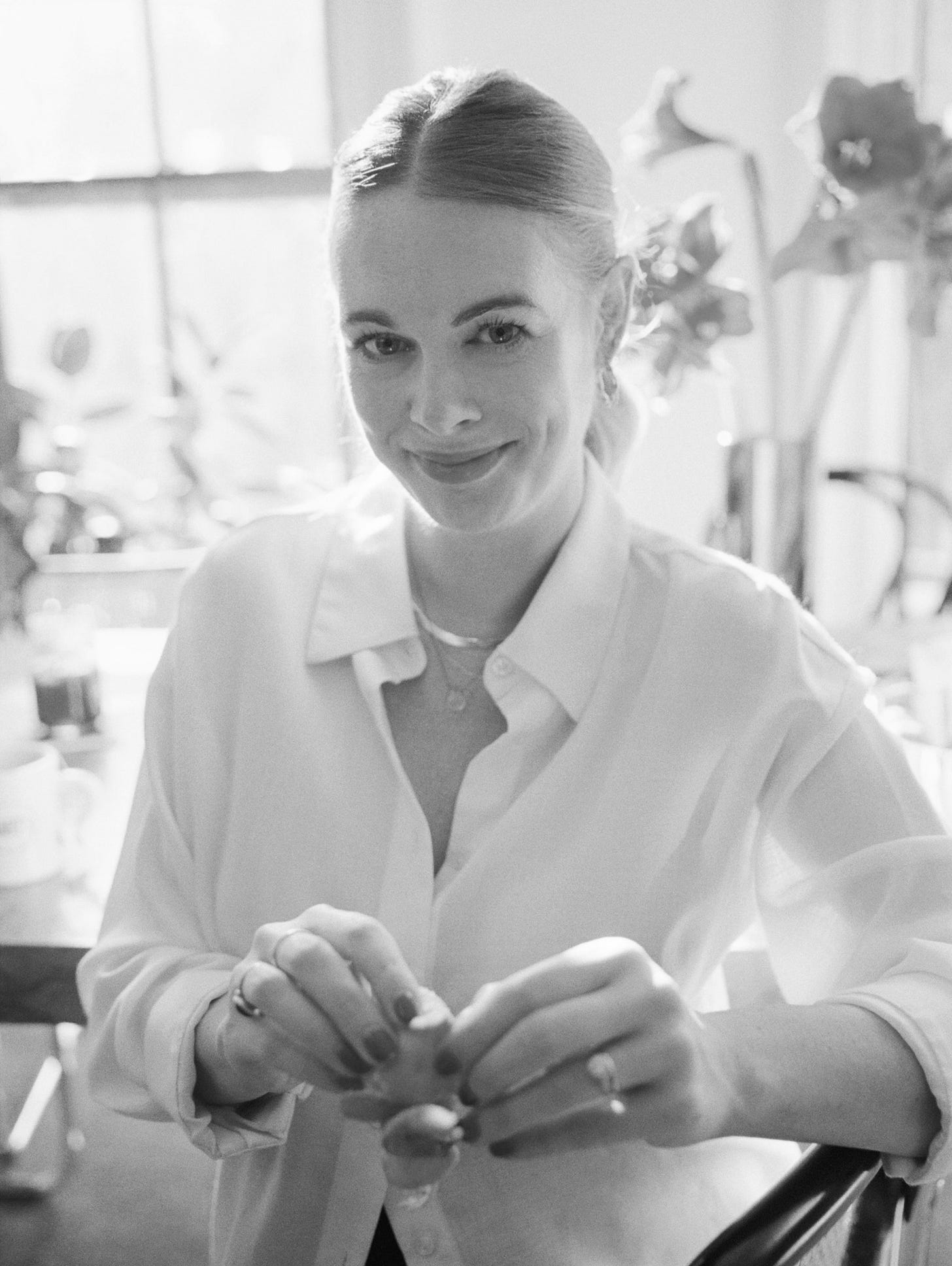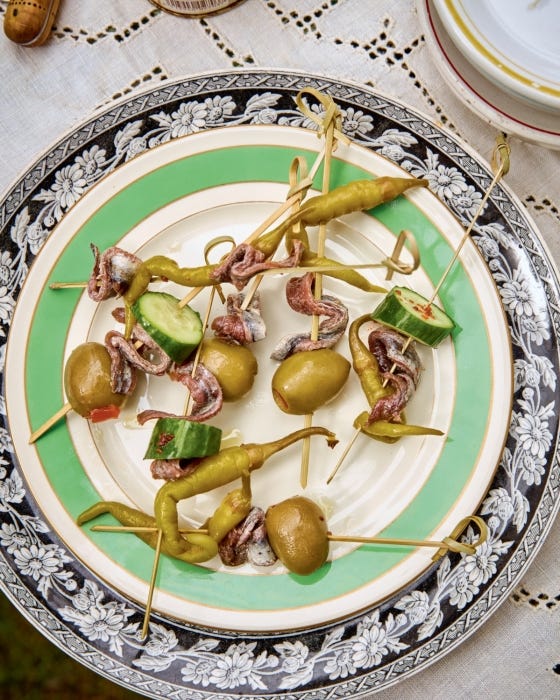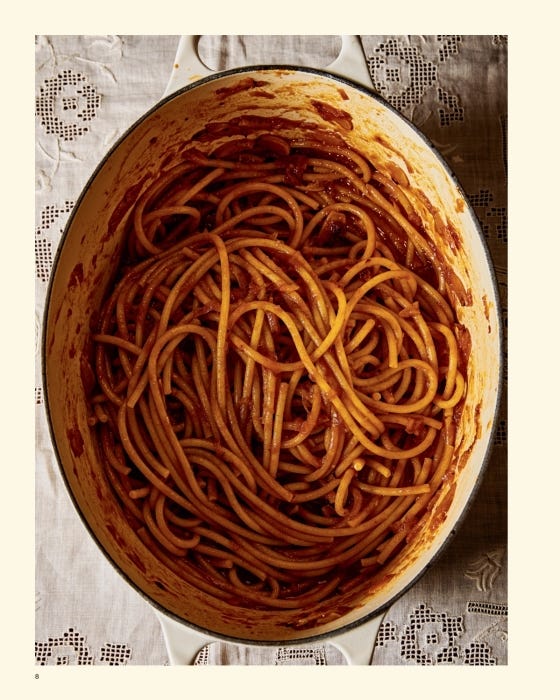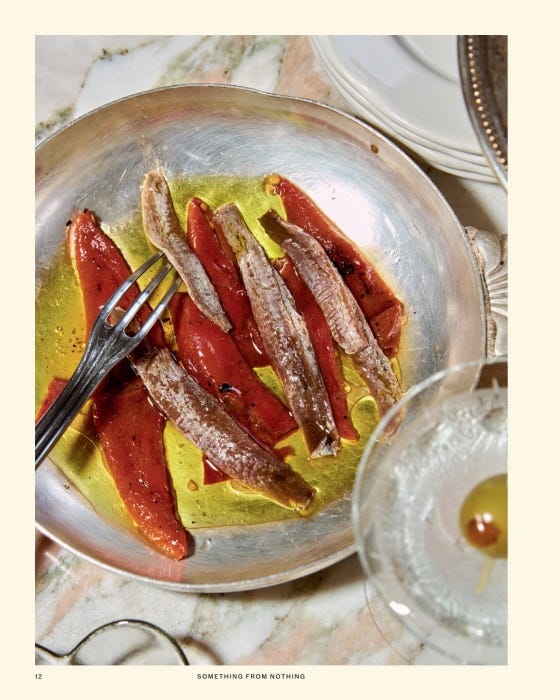Alison Roman doesn't think simple cooking is boring
The New York Time's best-selling author on her new book’s focus on pantry ingredients, doing more with less, and what’s in her freezer.
Alison Roman is a New York-based cook, writer, and author. Her first three books, Dining In, Nothing Fancy, and Sweet Enough are New York Time’s best sellers, and her fourth book, Something from Nothing, comes out on November 11th. She also writes “A Newsletter,” is the creator of the YouTube series Home Movies, hosts the Solicited Advice podcast, and in 2023, she opened First Bloom, a small grocery store in the Western Catskills.
In a previous life, she worked in restaurants, worked for magazines, and had a column in a newspaper before going freelance and writing cookbooks.
I regularly reference her books, and as you can tell, she’s booked a busy, so I was excited to grab time with her early fall. We chatted about her new book’s focus on pantry ingredients, making simple feel special, doing more with less, and what’s in her freezer.
Brianna Plaza: How did you get your first cookbook deal?
Alison Roman: I was approached by my first editor. She wrote me out of the blue and said, “I noticed that all my favorite recipes from Bon Appétit had your name on them and I said I have to meet this person.” I was 30, 31 at the time and I thought, I am too young to write a cookbook.
At that point, I had been working in food for 10 years — restaurants for 6-7, editorial for 4. People who wrote cookbooks were much older in my eyes and I just didn’t feel like I had been doing this long enough, that I was ready.
But my editor was like, “I think you’re ready. It takes a long time to write a cookbook.” I got an agent and turned an offer into a two book deal and started writing cookbooks. Then in 2019 I signed another two book deal right before Nothing Fancy came out. Something From Nothing is my second book in that two book deal.
Brianna Plaza: Tell me about the inspiration behind Something from Nothing and why you wanted to focus on pantry ingredients.
Alison Roman: I had been spending a lot of time upstate [New York], and cooking upstate is very different than cooking in Brooklyn. Living in New York City, if you need an ingredient, you leave the house, and 10 minutes later you have what you need, or you can have it delivered within 20 minutes. It doesn’t matter how far-flung or hard to get. We have incredible farmers’ markets everyday. Anything you want is within reach.
Being upstate, you have more limited grocery store options. The farmers’ markets are less frequent, the seasons are much shorter. And so in the dead of winter, if you have to make dinner and you’re missing something, you’re like, well, the grocery store is closed and I only have what I have, so I am going to make dinner with that.
I was forced to cook a little bit differently and a style of cooking followed suit. I also think I realized that that was how I cooked anyway. It didn’t feel particularly challenging, but it didn’t feel like I was giving anything up.
Brianna Plaza: Is your cooking style something you feel that you’ve refined over time or did you land on it early on?
Alison Roman: I think it’s still a work in progress. I mean, Dining In came out when I was 32, and now I’m 40. I think if anyone looks at their life over the course of eight years, they’re probably like, “Oh yeah, I don’t wear that anymore.” We all change. We all grow. I think evolution is a natural product of time and aging.
I think that’s all to say that I am still who I am, and my food is still my food, but I have evolved. And I think that discovering one’s style is always a work in progress.
But that said, I’d been cooking for almost 10 years before my first book. The style that I had when I first started cooking was very different than what I produced in my first book. And I’m really glad that I had all that time to figure out what my style was before I wrote my first book.
Ultimately, all of my recipes could really appear together. There are similarities across all of the books because it’s all my food. So whether or not you’re honing in pantry staples or having people over, I think the through line is that my cooking style has always really leaned heavily on making something from nothing. Doing more with less.
Brianna Plaza: How do you make simple recipes feel special?
Alison Roman: I think for me, simple is not boring in the right hands. But I also think that so much of food these days is designed for the gaze. It’s designed for people to look at and watch it be made. Does it make a good video? Does it play well on social?
But not everything does. Sometimes the best, most delicious things aren’t very interesting to watch. This is a brown book and that was intentional. That was a choice that I made. To me, that’s not boring. I think that cooking and ingredients are inherently interesting.
We should all slow down a bit, and take some time with things, and appreciate stuff for what it is, instead of breezing past everything and on to what’s next. Because you know what? A boiled potato is really good. And why is it good? Because you put a little butter and salt on it and it’s amazing. That’s not a recipe in the book but it could be.
The writing is such a big part of this book, and hopefully all my books, because I am really passionately telling you why this is good and why you should make it because I really believe in it and that it’s not boring.
You’re getting something out of it, even if there are only five ingredients.
Brianna Plaza: Why did you decide to put some of your existing popular recipes in the book?
Alison Roman: Because I didn’t want them just to live on the internet. The internet is a place full of information, but it’s just the internet. A book is a book and for me, I like to open a book and read it. I think having a collection of recipes that belong together is really important.
There are a lot of recipes that I’ve written that are popular that didn’t make it into this book because they didn’t fit the ethos of what this book is about. I think it speaks to the fact that I’ve been cooking this way for a long time and it resonates with people. Now you can find these recipes in a book and to me, this book really feels like who I am.
Brianna Plaza: Tell me about your brainstorming and recipe development process.
Alison Roman: I think for the book, I had to think about if it fits with the concept of the book. Does it feel balanced? Does it feel like food I want to eat right now? Am I excited to make it? Then I go from there.
There are a few recipes that didn’t make it in after the fact because I was like, okay, it’s too many of this, or too much of that.
The newsletter is very of the moment, I don’t really think about it. It’s very authentic in that I am not very calculated. There’s no editorial calendar. I think it’s very reflective of what I’m eating and what I’m cooking and how I’m living, which is a challenge when you’ve just have a baby and you’re not cooking, so you’re not really writing. Or you’re eating an English muffin, and you’re like, well shit, what am I going to write about?
Trying to get back in the swing of things when your lifestyle is not conducive to cooking all the time is a challenge. And even right now I am heavy into press, and trying to plan a bunch of things for the fall, which means I’m busier, which means it becomes more challenging to cook for fun and leisure, so then you end up cooking for sustenance, and that’s not always the most beautiful or interesting. So I think a lot about how to turn that into something that people want to cook and read.
Brianna Plaza: What keeps you motivated?
Alison Roman: I think honestly, I’ve always been really self-motivated because there’s no plan B for me. I never had a safety net. If I didn’t work, I didn’t make money, and if I didn’t make money, I couldn’t pay rent. I’ve never lost that feeling of just having to make it work, and I have to work hard to earn a living to live in New York. And now I have a baby and it feels like there’s even more pressure. It is a very weird provider mentality to realize I have to take care of my family, my baby and myself.
I don’t think I’m a workaholic quote, unquote. But I’ve always been really focused on making things, and I think that I don’t feel at ease unless I’m making something. And I think that is just how my brain works. The idea of going on vacation is so unrelaxing to me, unless I have a project, unless I’m working during vacation (don’t worry, I’m in tons of therapy.).
Brianna Plaza: Have you felt at any point that you’ve made it, or is there a point where you might feel that way?
Alison Roman: I’m trying to feel that way, because if I don’t feel that way now, when will I feel that way? The bar keeps moving and always will, but if you can’t stop and appreciate what you’ve done, when can you? And this year, I had a baby, and a pretty intense and borderline traumatic birth experience, and finished a book, and then promoted the book in the same year — it’s a lot.
When I first wrote my first book, I was like, “I’m going to win a James Beard award,” because that was the only metric of success at the time. And of course I didn’t, I wasn’t even nominated. And then I quickly got over it. And I realized that that wasn’t actually that important, and what is important is that people actually use the book and cook from it. Hearing from people saying that, “You changed the way I cook. You’re important to my family,” is actually important. That actually means I’ve made it.
That’s the metric of success that you actually have to start judging yourself by, and the external validation becomes less and less important. People are a bottomless pit, which is why social media exists. How many subscribers and likes is enough for you to be like, I’ve done it? That number will always change and it becomes impossible to keep up, which is why you have to really define success for yourself.
Brianna Plaza: My last question is somewhat obscure and mostly for my personal curiosity. Recently you’ve become a freezer person, so as a person who loves her freezer, I have to ask what’s in yours.
Alison Roman: Well, I’ve been making baby food. I’ve been doing purees, and I get those silicone ice molds and I portion the food in those because they’re the perfect size. Then I pop them out and put them in a Ziplock, and then we can defrost them as we need them.
Otherwise, I always keep chicken in my freezer. I always keep ground meat because if I don’t know what to make for dinner, if I’m having people over, I’m like, “Oh, I can make a meatball or I can make a bolognese.”
Anytime I get something where I’m like, “Oh, I’m not going to get through this,” now, I just turn into a puree and I freeze. Blueberries, I cook down, add sugar, and freeze it. Any sort of greens, I cook down with a head of cauliflower and some lentils or rice and broth, and freeze it. Oh, I always have broth. Sometimes there’s a bolognese, sometimes there’s beans.
Some puff pastry is always in my freezer because a pot pie is never far. And we’re entering pot pie season, thank God.








Loved reading this, what a great opportunity to interview her! Hope she was as cool IRL.
This was great article especially as I am a freezer girl